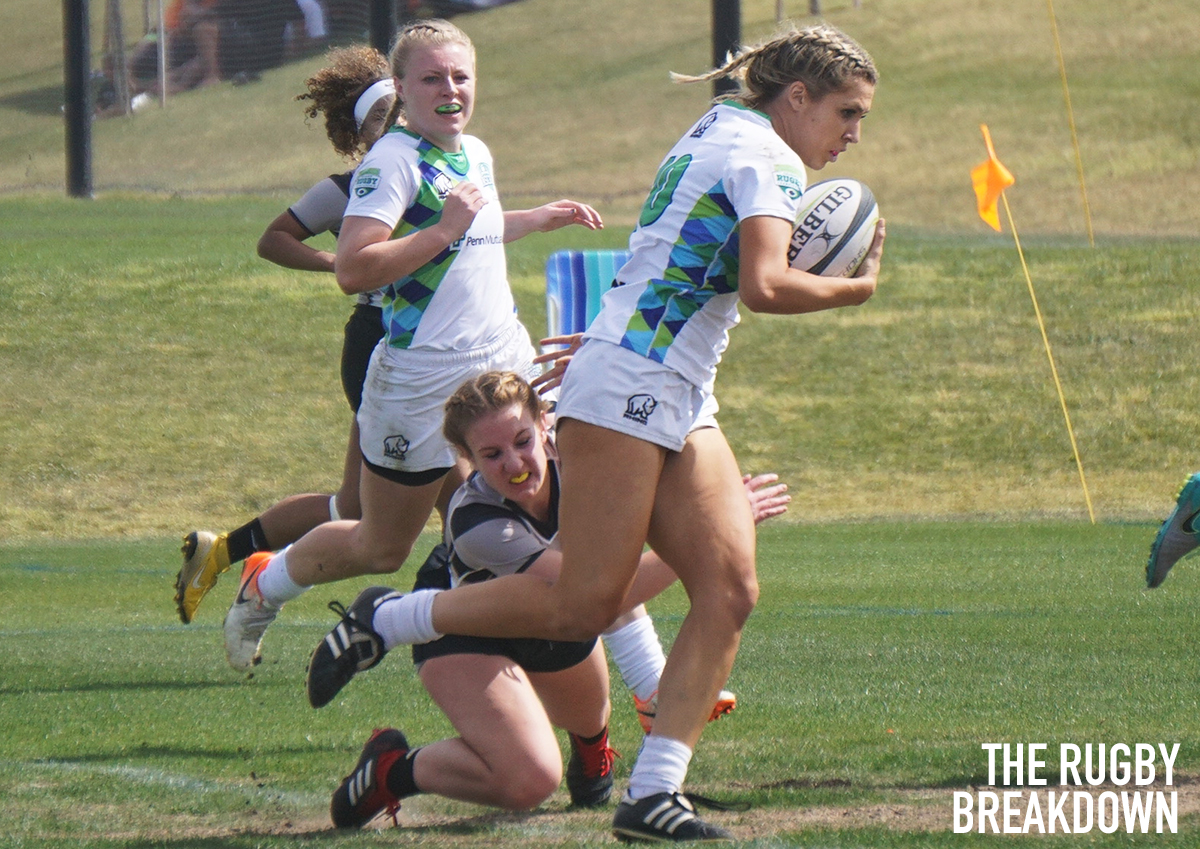
At first consideration, beauty pageants and rugby are at opposite ends of the activity spectrum; however, the two pursuits are rooted in competition and the curation of one’s best self. When Britni Ebert debuted on the pageant circuit, she placed last and nearly threw in her sash if it wasn’t for a nagging desire to rewrite her ending. When the Californian found and immediately fell in love with rugby, she insatiably found ways to better and advocate for herself. It’s a competitive drive that means Ebert will never be described as “untested potential,” and after sampling the lives of USA 7s residents, know that Ebert is plotting her course to Chula Vista.
Five years ago, a beauty pageant director contacted Ebert through Instagram, inquiring whether the Calabasas, Calif., native wanted to give pageants a try. She was intrigued and so with a nothing-to-lose attitude entered the circuit at age 16.
“I finished dead last,” Ebert said of her first pageant. “I’m super competitive, so it was, ‘No, this is not for me. Never again.’ But I was embarrassed. It was eating me alive that I got last place so I went back. Then I started enjoying them more, especially once I realized it was more than a competition.”
Two years and nine pageants later, Ebert earned her first of four titles: 2018 Miss Century City. The crown was both satisfaction and motivation, a combination that would also emerge from a new pursuit.
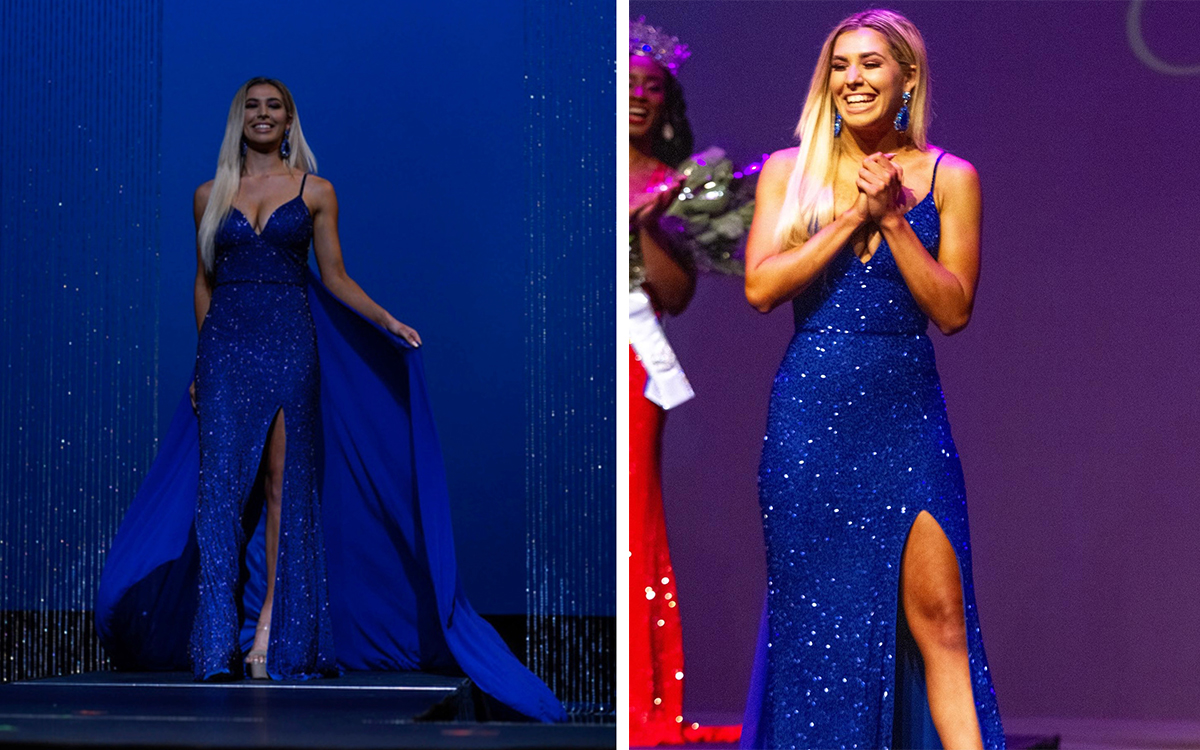
After high school, Ebert moved to San Diego to become a real estate agent, but the former soccer player longed for an athletic outlet. A friend introduced her to rugby, just as nearby MiraCosta College was propping up its women’s program. She enrolled with enough credits for eligibility, and showed up for practice in fall 2018.
“Pretty much immediately,” Ebert said of the moment she knew she wanted to play rugby at a higher level. “In soccer I was always in trouble for being too aggressive and got yellow cards all the time. As soon as I was able to tackle and just play and do everything that rugby offers, I realized that this sport fits me as a person perfectly. I scored all of my team’s tries in my first game, and it was, ‘Wow, I can see myself playing at a higher level. This could be my life, potentially, and I want to see how far I can go.’”
Pacific Coast leagues play 15s in the spring but their small colleges have always been eligible to compete in the National Small College Rugby Organization (NSCRO) National Championship, which occurs in the fall. (NSCRO 7s nationals is in the spring and sees more West Coast involvement). Thus, in November 2018, MiraCosta accepted an invitation to the NSCRO western regional championships in Wayne, Neb.
“I knew NSCRO and select side coaches would be there, and that it was an opportunity for me to show my skills and get my name out there,” Ebert sized up the event.
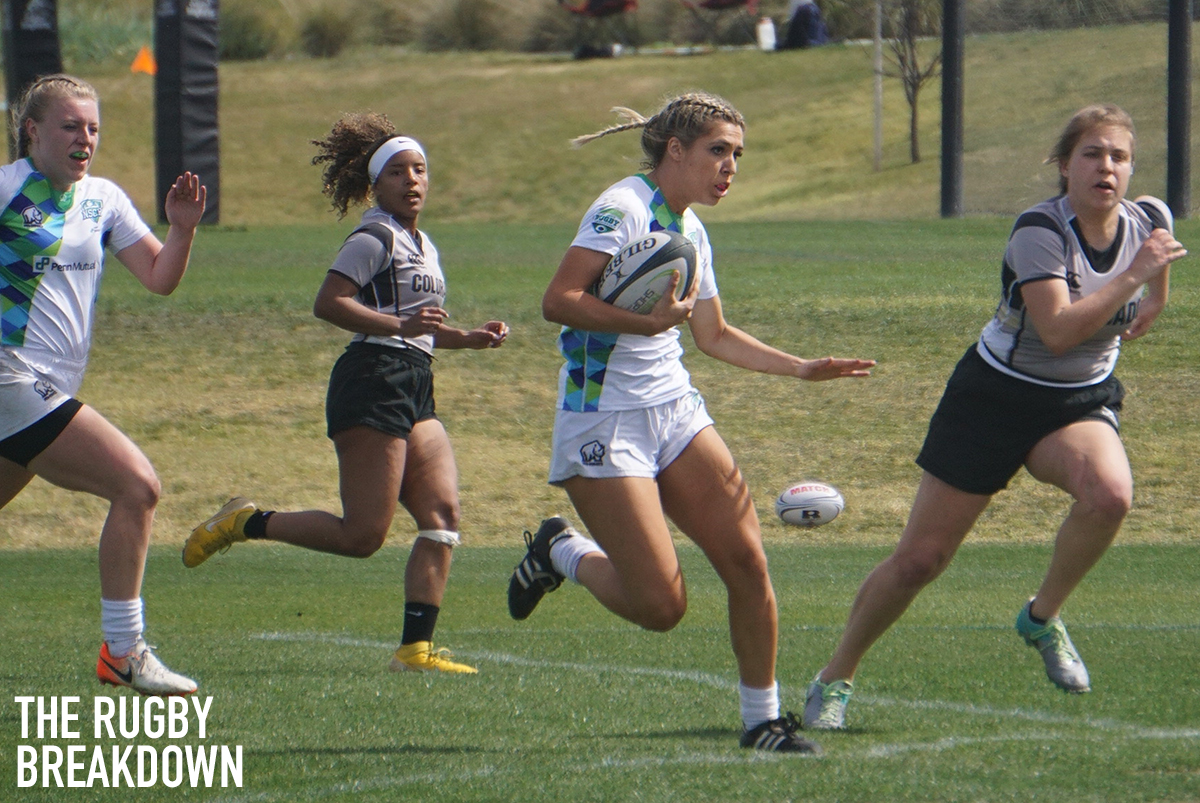
“It was insane,” the fullback said of the tournament. “I’ve been in California for most of my life and the coldest it gets is low 40s, high 30s. Everyone knew it was going to be cold and showed up with a jacket, but we were not ready for six degrees and negative wind chill. We went to the local thrift store in Wayne and bought up all their Under Armour and sweats – anything – because we were so shocked by the cold.”
NSCRO Women’s Commissioner Bryn Chivers remembers that tournament as well, and chuckles when he recalls MiraCosta running subs out of a nearby parked van, swinging the sliding door open for the exchange of warm and frigid teammates. Nevertheless, the Californians beat Colorado College in the Round of 16 and then fell to eventual national champion Wayne State College in Sunday’s quarterfinal.
“I wish we could have played Wayne in better weather. I did well but it wasn’t the best I’ve ever played, so I was disappointed,” Ebert said. “But that’s where I met Bryn for the first time. He saw something in me and so we talked quite a bit. He took a leap of faith and asked me to play with them in Las Vegas. I did, and so [regionals in Nebraska] did what I wanted it to.”
MiraCosta was actively playing 15s in January and February, and so Ebert was in a good place when she reported to the 2019 Las Vegas Invitational (LVI) to represent the NSCRO Selects. Chivers brought two teams that year, and they both advanced to the college final.
“The coaching was exactly what I needed to get to the next level, and I could take it back to my team as well as my kids – I coach U12 girls and boys with Fallbrook,” Ebert said. “We got there two days early and had two-a-days. I had never played 7s before and now it’s my favorite.”
Ebert didn’t know anyone besides her two MiraCosta teammates but looked toward the Wayne State College players for guidance.
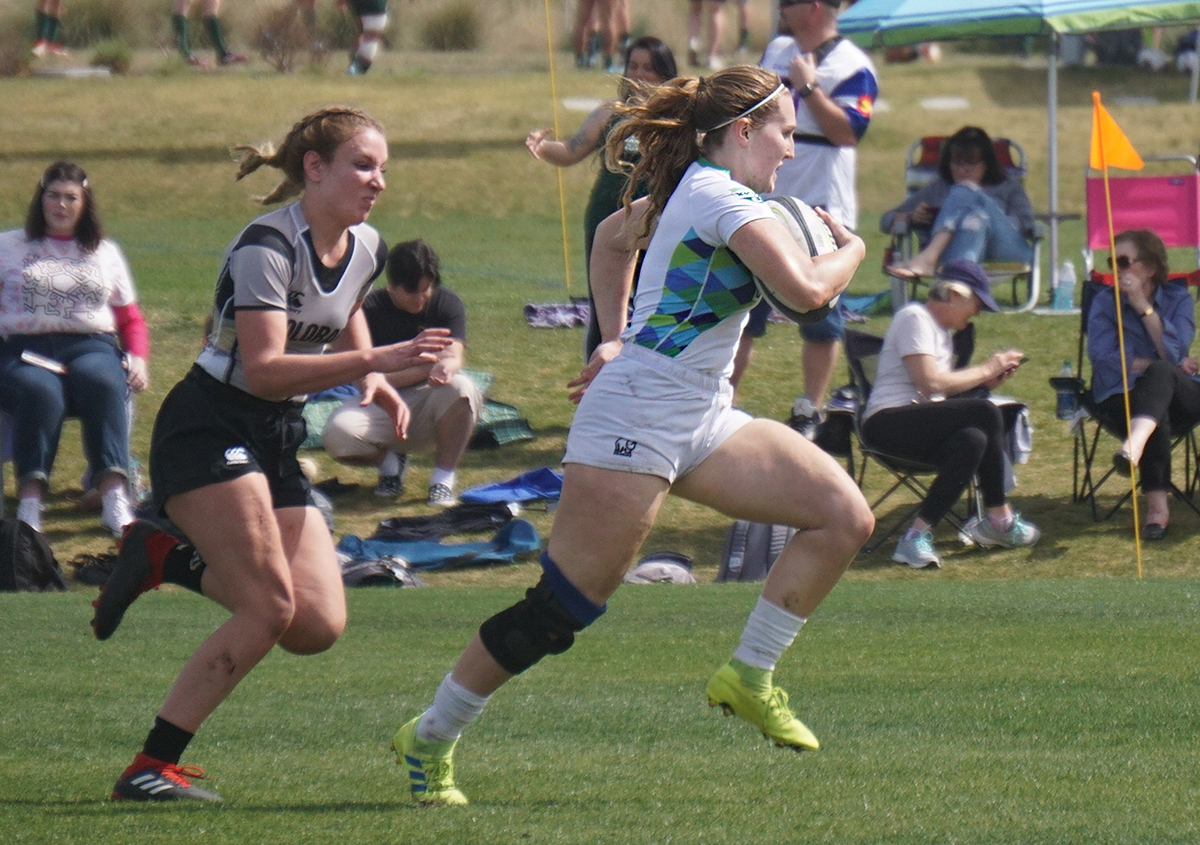
Brook Hoesing / Photo: Jackie Finlan
“My captain, Brook Hoesing, helped me with everything and I still look up to her,” Ebert said. “She told me: Be confident in what you do on the field. Your passing is good, you’re ready to go, and – I was playing wing at the time – if you get that ball and see grass in front of you, just go.”
But it was the critique that Ebert really responded to. She didn’t know that, for example, her passing needed improvement, and those realizations stoked more goal planning.
“It’s so easy to learn from Bryn,” Ebert said. “How he critiques and fixes your issues, it’s not negative. He knows every player and how they can be better.”
The LVI was a turning point for Ebert. She got her first taste of select side rugby and valued the growth opportunities that came with it. She chased that repeat experience.
“One thing we do before the game helped me realize that this is the team I need to play for: We link up on the captain in front, hands on shoulders, and walk to the field in complete silence. Take that moment to really connect with each other and go on the field as one,” Ebert said. “That is always meaningful to me. Rugby is more than sport, it’s a community, my family now, and NSCRO really resembles that. They highlight players who don’t get a chance to be seen because they’re not at higher-level schools. That’s what they did for me, and I’m so thankful.”
Ebert and MiraCosta competed at the 2019 NSCRO 7s National Championship and finished ninth out of 16 teams. She then joined the NSCRO Selects for the CRC 7s, now defunct but previously a very visible tournament that featured on ESPN channels with limited women’s games inside the professional stadium. The team had three days to train for the tournament, and Ebert was amped for the exposure.
“During the flight to Philly I started to get a really weird feeling in my throat, like a bump, and it got harder to swallow,” Ebert recounted. “The next day, I couldn’t eat or drink because my throat was so swollen. On the third day, I had to stop training because I was going to pass out, which is so unlike me. I never stop.”
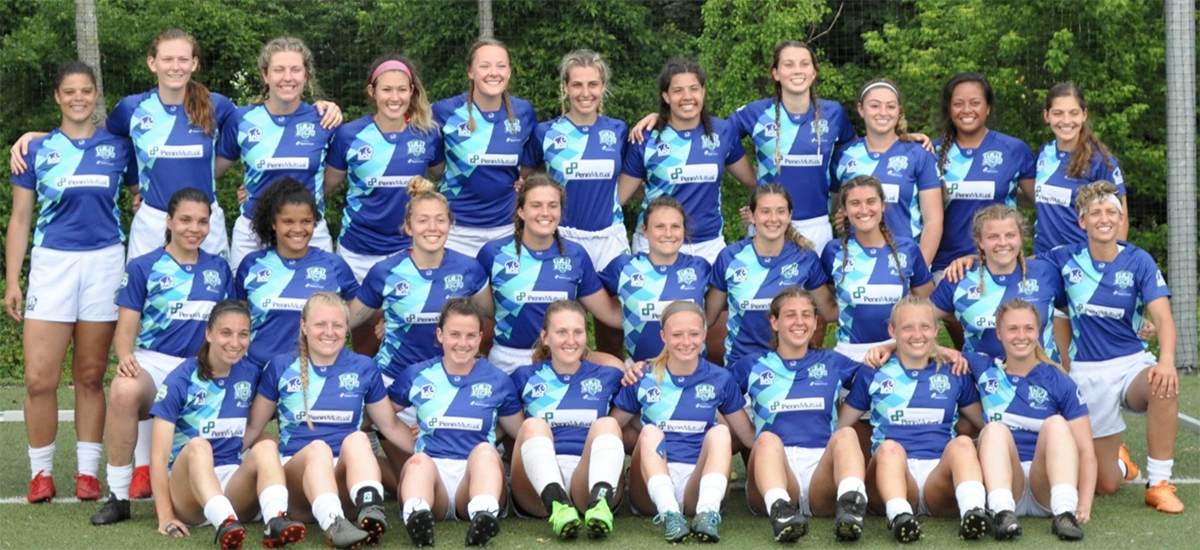
The first NSCRO 15s Select side
Ebert played in the first CRC 7s game against Army – and recalled a brutally physical shutout – and then caved to the staff’s request that she consult the tournament medic.
“You need to go to the ER immediately,” Ebert recited the medic’s advice. “My throat was swollen shut. Bryn was like, ‘How are you breathing!?’”
Ebert had emergency surgery on a peritonsillar abscess and was awake while it was opened up and drained. As soon as she was able to see the doctor, she asked a very important question.
“Can I play rugby tomorrow,” Ebert laughed at her priorities. “I got a doctor’s note saying that I’d be fine.”
She was able to play in the stadium, although NSCRO lost to Life University in that semifinal, but ended the day with a win against Notre Dame. Ebert then joined the first NSCRO 15s Select team immediately after the CRCs, and played two games against the USA U20s, who were readying for the U20 Tri-Nations Cup in England.
“Two weeks after surgery the tests came back that I had strep throat,” Ebert marveled. “I impressed myself. I told myself I had to play, that there was no way I wasn’t go to play. On the other hand, ‘Britni! What if you were actually going to die!? You still have to play?’”
The U20 7s coach, Dave Clancy, saw Ebert in Philly and invited her to an All-American camp at Life University two weeks later. The assembly and three others around the country were selection venues for the Collegiate All-American (now USA U23) 15s team at Women’s All-Star Week and an All-American 7s camp in Colorado. Ebert wasn’t picked for either team and was disappointed but took the omission as a sign that she wasn’t ready for the call-up.
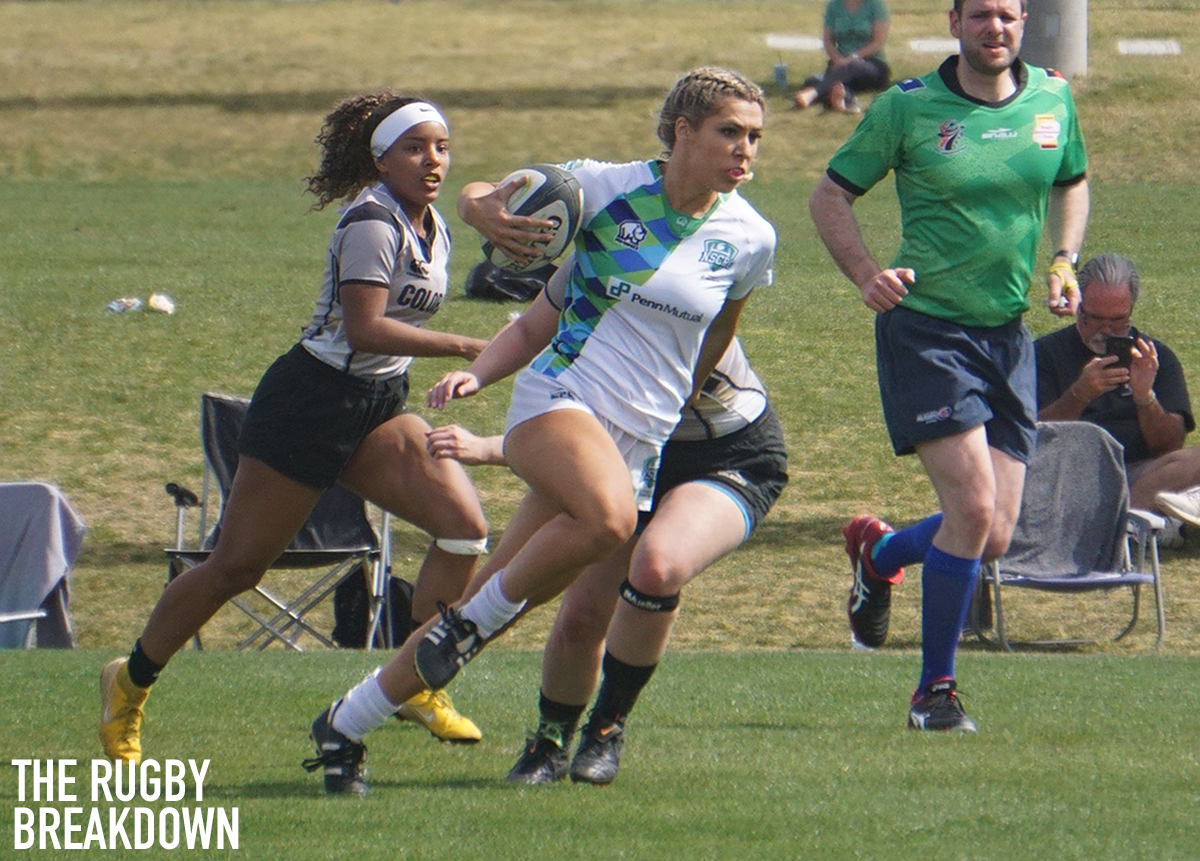
“Britni is tall and strong at about 5’10”. She’s a very physical fullback in 15s and then she plays loosehead prop in 7s,” Chivers described Ebert. “She’s very fast, and that’s the thing: On a 7s field we play her as a forward on the outside and because of the incredible speed she brings to that side of the field, in a tall, physical body, she has great advantages over most of the players she’ll come across, especially in 7s. She has all of the skill sets. Her passing is sound and tackling is sound, good foot. She can and does kick conversions for us. And so from fullback she can counterattack with speed and foot.”
Chivers is a former USA U20 head coach and so he’s primed to recognize players who have both the skill and mentality to project to the national team.
“What’s special is things like commitment, drive, the desire to actually want it,” Chivers continued. “It’s the desire to set a goal that you want to be a national team player, and then ask, ‘How do I get better?’ If players aren’t calling me or other select side coaches to ask, ‘What are my flaws and how do I solve them,’ then they probably don’t have that internal desire to go up. It’s not just all the physical attributes; you’ve got to want it and become a student of the game.”
Ebert calls Chivers often. Whenever she has a question – no matter how obvious the answer might be – she asks it. When she was over-committing to tackles and getting stepped inside, she called Chivers and they devised a drill that blended speed, balance and flexibility to a contact point that she could control.
“She was looking for real-world solutions to a problem she recognized, and that’s really different,” Chivers said. “She’ll send me links to a game. ‘I don’t understand what happened. Did this player make a mistake on defense, because it didn’t look too threatening but the other team scored.’”
Ebert and MiraCosta made impressive gains during the 2019-20 season. The team went 4-0 at Scrum By The Sea, beating Cal, UCLA, Occidental and Sacramento State. MiraCosta was third in the USA Rugby DII Pacific Desert standings, with losses to powerhouse Claremont College and a single-digit decision to Long Beach State. The game against the 49ers ended up being MiraCosta’s last league game of the season, due to Covid-19, and Ebert scored the majority of the team’s 59 points.
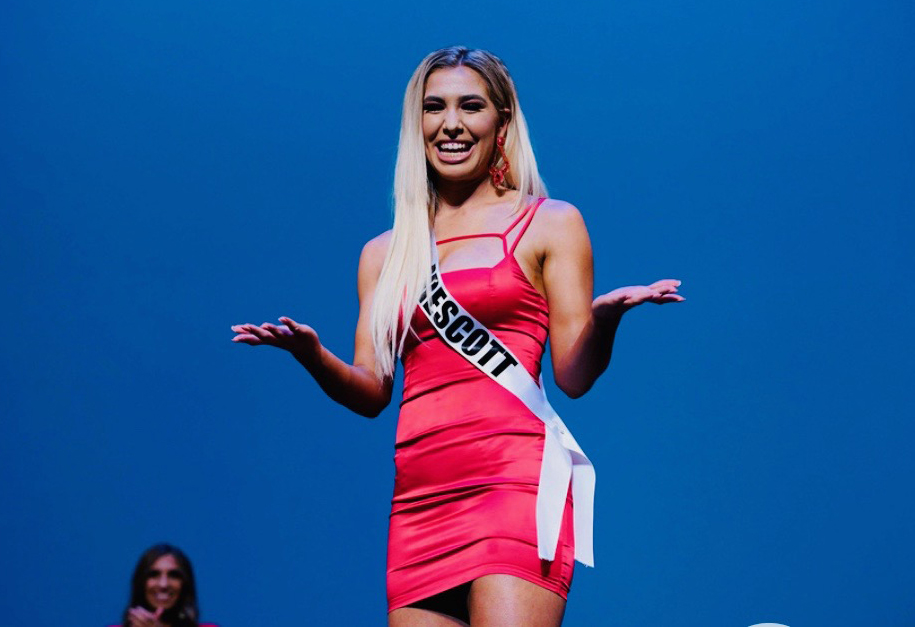
Meanwhile, Ebert kept building momentum on the pageant circuit. She had two city titles behind her and started 2020 with a top 16 finish (out of 50) in the Miss Arizona competition.
“There was an orientation for the Arizona pageant, and one by one, everyone says something interesting about themselves,” Ebert said. “Some were interesting – one girl said she’s done kung fu before – but when I said, ‘I play collegiate rugby,’ all the girls turned their heads looking at me like, ‘What!? You’re crazy!’ Right then and there I showed them clips of me tackling, getting breakaways. They all know about it now and are super supportive.”
Rugby is a favorite topic during the interview portion of the pageants, and the judges are always fascinated by a beauty queen in boots. That image essentially came to life on Feb. 22, when Ebert reported from the Long Beach State match to the Miss Studio City pageant that same evening. She had some game bruises and had used makeup to cover them up in the past, but took a different approach this time.
“I’m not going to cover them up this time. I’m going to win with these with confidence and see what happens,” Ebert recited her mindset. “Of course the judges said, ‘We’re going to ask about your bruises, are they from rugby?’ ‘I had a game this morning,’ and they laughed. ‘You’ve got some confidence to wear them here!’ But I told them, ‘This is a part of me. Why would I hide what I do? If don’t win because of my bruises, then I don’t want this title.’”
Ebert won the 2020 Miss Studio City crown, and then four days later reported to Newport Beach to join the NSCRO Selects competing at the Los Angeles Invitational (LAI) 7s. She brought her crown and sash and still had her pageant nails that needed removal.
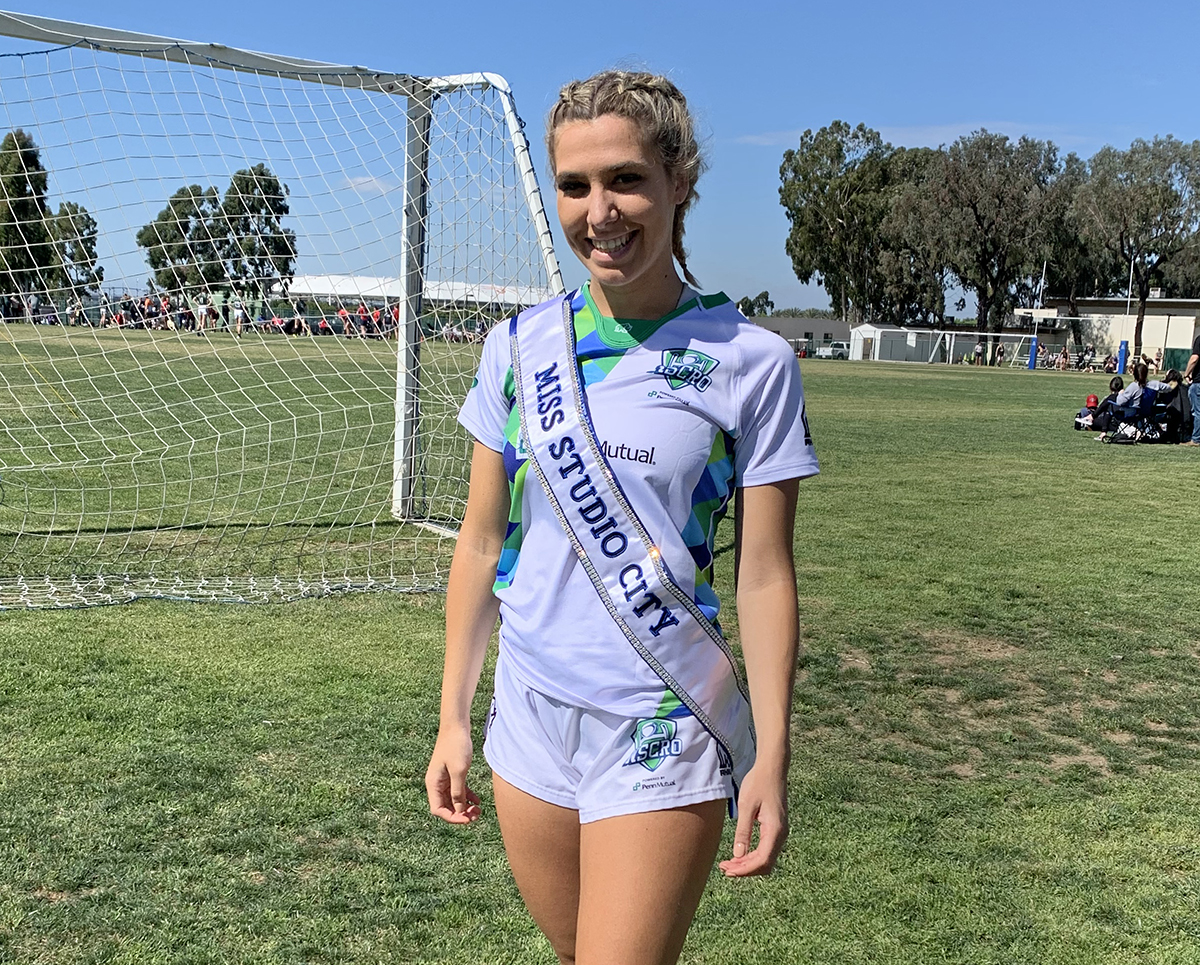
“When I told the rugby girls about pageants, at first they laughed at me, but then it was, ‘OK, Brit, we can see you doing that,’” Ebert said. “At the LAI 7s we rented an AirBnB house. I’m the only one from California, so I was there with my hair down, makeup, sandals, and everyone showed up looking all athletic. Bryn was, ‘There’s my pageant girl!’ They think it’s funny but they also think it’s really cool.
“With pageants you’re taught not necessarily to be perfect but be the best you can be,” Ebert talked similarities with rugby. “I’ve always lived by that but in pageants it’s making sure you’re showing off your best qualities and that the judges know who you are and what your strengths are. Discipline comes with that. If you don’t make time to practice for interview questions or stay educated in world news, you’re not going to be successful.
“It’s the same with rugby. You have to be disciplined to eat and train right,” she continued. “But the confidence I’ve gotten from pageants is different than the kind with rugby. In pageants I’m confident in what I look like and in my body. Pageant girls are more fit, like a model, and aren’t necessarily cut, so that’s where I stand out because my look is a little different. In rugby, confidence is a mental state – being confident in a tackle or in a run you’re going to take.”
Much like the NSCRO playoffs in Wayne, Neb., Ebert knew that the LAI 7s was a chance to be seen and showcase herself for consideration at the next level. NSCRO beat Utah State, Colorado and New Mexico State 135-12 in pool play, and then lined up against Lindenwood in the semifinals, the fourth game on a hot day.
“They won [24-12] but at one point I had my opportunity to really show off my ability to play, especially against such a big team like Lindenwood,” Ebert recalled a moment in the first half when NSCRO trailed by one try. “I got the ball, saw grass and a girl in front of me. ‘It’s 70 meters but I’m going for it!’ It was a long, beautiful try, and it was a really good game.”
NSCRO finished 3rd after a big win over Kutztown.
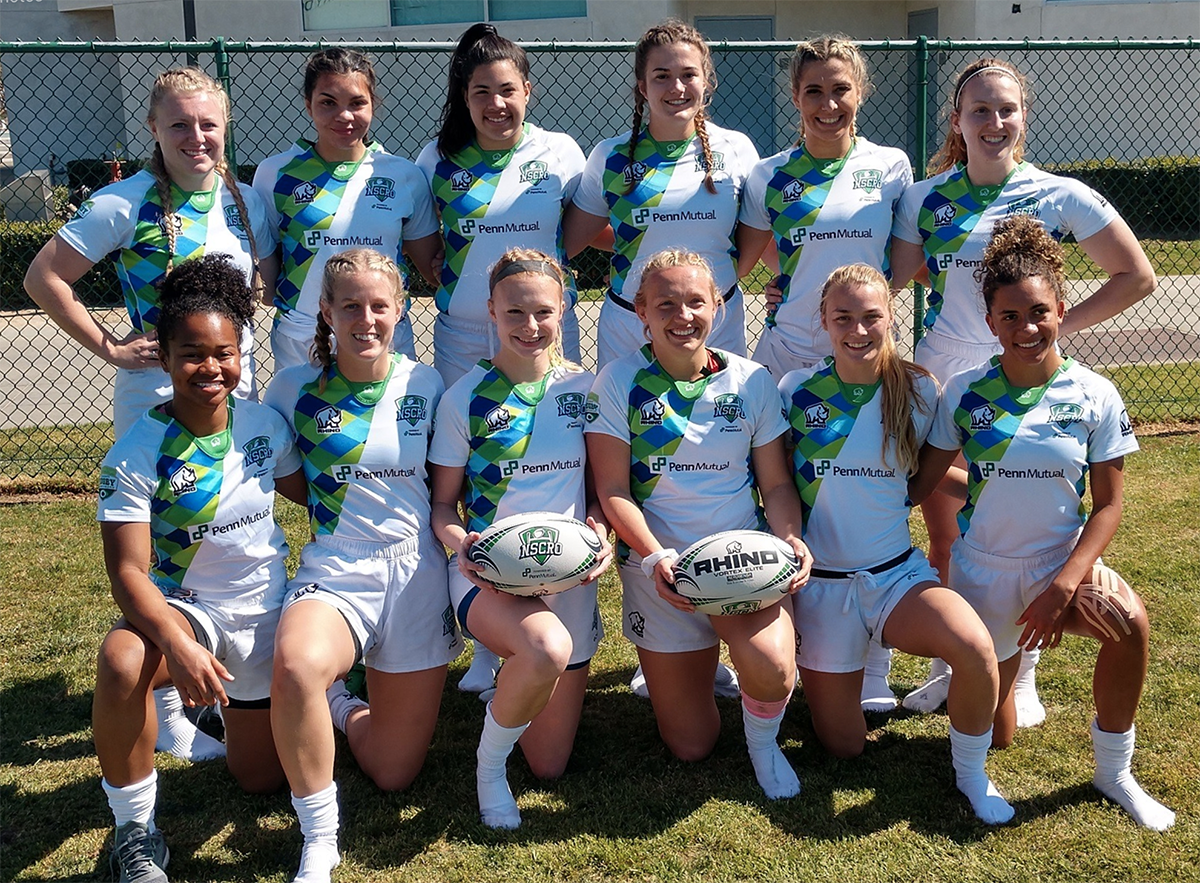
“That was the best team I ever played for,” Ebert said. “Some teams have drama or players who want to outshine someone else, but everyone worked together and for everyone else. We showed that we can put up a fight against Lindenwood and make them scared that they won’t this game, even though we’re a bunch of players from small schools.”
Chivers checked in a few days later to inform Ebert that she scored the most tries on the team.
“I’m really proud of you,” Ebert recited Chiver’s feedback. “I’m so impressed and I think you’re ready for the next level. Check your e-mail.”
Chivers had e-mailed Clancy, Emilie Bydwell and Katie Dowty with footage of the weekend and indicated that Ebert had a very good tournament and has grown since her last All-American interaction in summer 2019. Clancy called Ebert 10 minutes later and invited her to the remote athlete camp at Chula Vista.
Ebert alerted the pageant group about her invitation and they effused with support. They sent messages and cards wishing her luck, and planned to drive to Chula Vista (until Covid-19 intervened) in their crowns and sashes to watch her play against Mexico and Jamaica.
“That was the best experience of my life,” Ebert said.
During her introduction to the high-performance lifestyle, Ebert experienced how the professionals care for and prepare their bodies for the pitch. She absorbed as much information as possible and asked a ton of questions, especially since many of the campers were returners and familiar with the systems being taught at the center. She developed a more nuanced understanding of details and how the game is so much more complex than completing the tackle in front of you. She enjoyed the exposure to national team staff as well as the feedback provided by GPS trackers and the nifty sports bras that held them. And she celebrated triumphs, from finishing second during the Bronco (5:20), to scoring multiple tries against Jamaica and Mexico.
“I was more impressed with my team and how we were playing,” Ebert said of the international competition. “Stepping on the field and saying, ‘USA on 3,’ I was just trying not to cry.”
Ebert was star struck when she watched the Eagles train and was touched that the residents showed such interest in the campers.
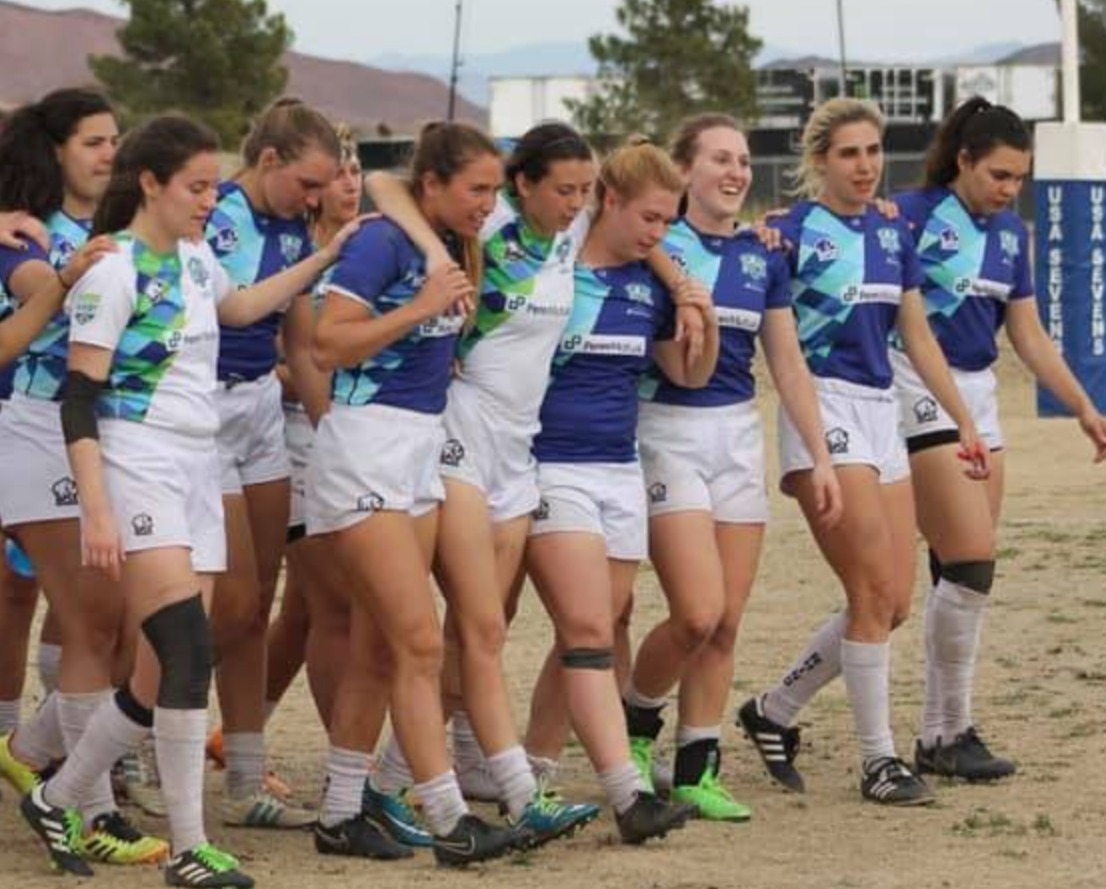
“Camp also taught me that no matter where you go to play – a small community college or a select side or camp – you belong to a community and it’s always the same,” Ebert said. “I was scared that international-level players wouldn’t treat me the same, because who am I? Just some girl coming in. But everyone was so welcoming and answered all my questions. The Eagles were so interested in my story and what I wanted to do with my career. That’s why I wanted to play as much as possible, because of the people and community.”
That five-day camp in mid-March ended up being Ebert’s final rugby outing before the Covid-19 shutdown, but it was everything. Ebert saw the final destination and new end-goal, and will be employing that competitive drive to get there.

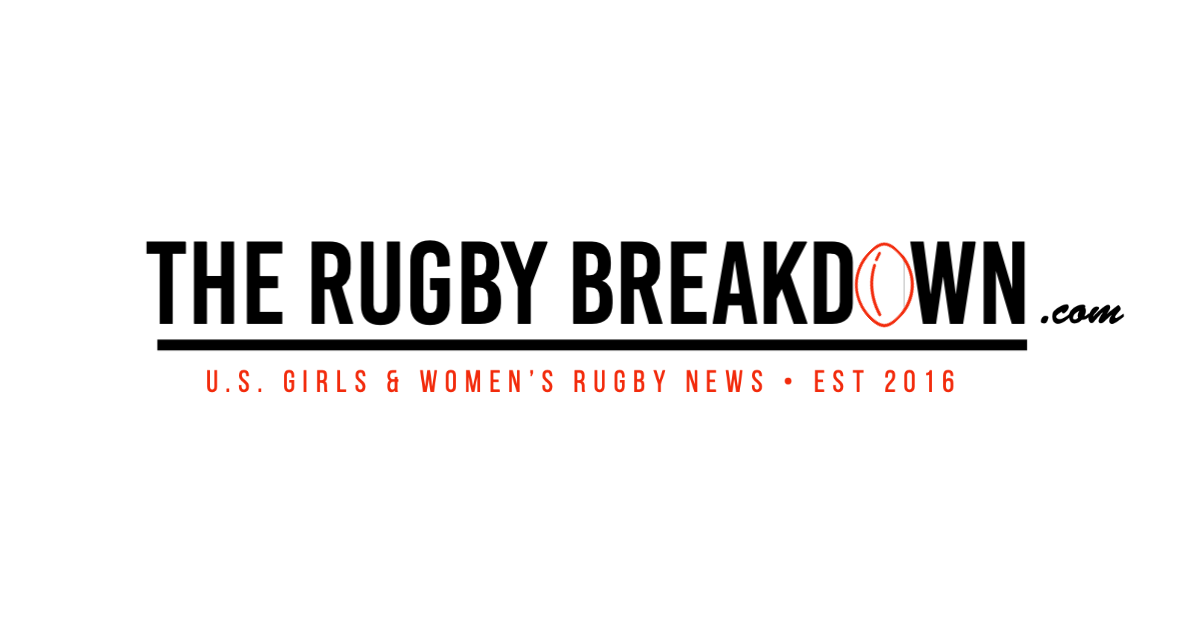

All Comments
Pingback: West Overcomes Odds to Win All-Stars on Debut - The Rugby Breakdown